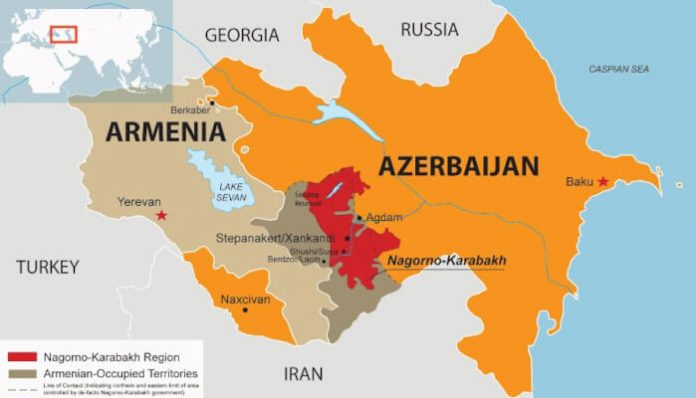KHAJAG AGHAZARIAN
In an unprecedented conflict escalation, on May 12, 2021, Azerbaijani military forces infiltrated Republic of Armenia territories at several locations along the international border. Despite the gravity of the act both parties acted with restraint: Azerbaijan showed limited willingness to start a new war while Armenia declared the new provocation must end through peaceful means. Nevertheless, both parties expressed their readiness to resort to military option if needed.
Russia set its position regarding the escalation on May 13 when President Putin declared his country is ready to assist Azerbaijan and Armenia settle the border issues through negotiations. Putin’s statement did not include a request for Azerbaijan to withdraw its troops from Armenia, nor did it consider Baku’s behavior a threat to the territorial integrity of Armenia. According to Russia, there is a pending demarcation work of technical nature that needs to be carried out which requires collaboration from both sides. The Russian position towards the new conflict had not changed since then.
Armenia’s first official diplomatic reaction came on May 14 when it appealed to the Collective Security Treaty Organization (CSTO) to resolve the new crisis under Article 2 of the CSTO treaty. This article states that in case of any threat to the sovereignty of one of the member states, the organization should “(…) launch the mechanism of joint consultations… [to] develop and take measures for assistance to such Member States for the purpose of elimination of the arisen menace.” These mechanisms are meant to be non-military tools such as diplomacy, mediation and negotiation. Armenia avoided embarrassing Russia since the beginning of the crisis by not demanding military assistance from CSTO member countries as stated in Article 4 of the treaty. More importantly, by resorting to Article 2, CSTO member states did not have to treat the issue as one related to the territorial integrity of Armenia but rather as a border demarcation dispute that requires technical resolution.
In a statement on May 19, Russian Foreign Minister Sergey Lavrov repeated the position of his country adding that Russia proposed setting up a joint commission between Armenia and Azerbaijan to demarcate the border. Furthermore, Russia declared on several occasions that Azerbaijan is welcome to rejoin the CSTO. This Russian policy of appeasement of Azerbaijan was reconfirmed on May 25 when CSTO Deputy Secretary General Valery Semerikov stated that the conflict requires measures “(…) first and foremost of political and diplomatic nature, as well as resolution of issues on delimitation and demarcation of border between Armenia and Azerbaijan.” Nothing is mentioned regarding the territorial integrity of Armenia, not to say condemning Azerbaijan for its military incursions and demand immediate withdrawal of its troops. On May 26, CSTO press Secretary Vladimir Zaynutdinov reiterated to reporters General Semerikov’s statement indicating that “the CSTO has taken note of the application” submitted by Pashinyan. On this same day an Armenian serviceman was shot dead near Verin Shorzha village of Gegharkunik province.
Armenia replied to the Russian position when acting Prime Minister Pashinyan stated during parliamentary hearing session that “The CSTO members must present their clear position on the situation, which they have failed to do yet. None of them has stated that Azerbaijan should withdraw its troops from the territory of Armenia.” He added that Armenia might resort to UN Security Council since the “mechanisms of the CSTO or Russia in this situation are insufficient to resolve the problem.” On the following day six Armenian servicemen were kidnapped and taken hostages by Azerbaijani forces in Gegharkunik region.
Following CSTO’s and Russian non response, Pashinyan paid a short visit to France and the European Council on June 1 – 2 in search for a counterbalance to the increasing Russian and Azerbaijani pressure. Pashinyan met with French President Emanuel Macron, the President of the European Council Charles Michel and Belgian Prime Minister Alexander Croo. All official statements following these meetings demanded Azerbaijan to withdraw its troops unconditionally from all Armenian territories. Similar demands were made by the United States and other Western powers since the first days of the crisis. Although during Pashinyan’s visit nothing was declared regarding bringing the issue to the UN Security Council, Armenia has kept this move as an option.
In light of the latest security and political developments it is being reaffirmed that Armenia must redefine its foreign policy and relations based on the new dynamics of relations in the region. Iran showed increasing interest and will to develop its strategic relationship with Armenia at different levels including military and economic. Armenia may benefit from Iran’s reproachment in restoring some balance in the region and regaining diplomatic initiative to settle its issues with Azerbaijan.
Armenia is left alone in this new political realignment. More worryingly, since the end of the Second Karabakh war on November 9, 2020, Armenia could not come forward with any serious move that could reset its role in the region. Military and security agreements that tie Armenia to Russia since the collapse of the Soviet Union were not honored and proved to be of secondary importance for the ailing regional power. Russia is seeking to have a new friend and ally in Southern Caucasus namely Azerbaijan that can serve best its interests. Russia is desperate for new economic and geopolitical relationships that may bring some strength to its slowing economy and to its ineffective military might. Armenia should take the lead in defining its foreign relations and in bringing forward fruitful initiatives that reposition the country according to its strategic importance.

